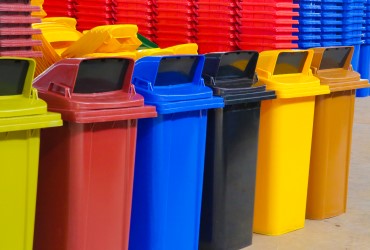Mail Us On
info@upprghana.com
In recent times, many the presence of plastic waste all over the world is posing a challenge. Plastics have now entered the sea causing havoc to life in the ocean. As a result, many countries round the world are putting in place measures to reduce the nuisance of plastics and their devastating effects on society and nature.
“The world is waking up to a crisis of ocean plastic and we're tracking the developments and solutions as they happen,” says an article in the international media in June last year.
One company in Ghana that has chosen to be part of finding a solution to the menace of both hard and soft plastics is the Universal Plastic product and Recycling Limited (UPPR).
Company
Established in the year 2013, the company is one of the leading producers of top quality injection moulded waste bins in the West African sub-region.
With the vision to be the leading waste bin producer in West Africa, the company is doing wonders through plastic recycling.
UPPR uses a combination of recycled and virgin raw materials to produce waste bins in 240- and 120-litre sizes in its ultra-modern factory located in Borteyman, Accra. The company is also into the production of party chairs and 20-litre buckets.
“As a company UPPR strives to achieve excellence in all its activities.
We have contributed immensely towards environmental sanitation through the production of top-quality waste bins for Ghana and the West African market,” said Kwadwo Asomaning, the acting Managing Director of UPPR.
He said UPPR was positioned to do more in plastics recycling in the months ahead.
“We are putting in place measures to expand our activities into other areas of the plastic value chain such as the processing of PET plastics in partnership with international agencies and multinational companies interested in the health and prosperity of society.
This is in addition to the processing of other plastics by UPPR currently.
Supporting the MD, the Head of Operations of UPPR, Mr Philip Akoto, revealed that made-in-Ghana plastic products were very durable, especially those produced by UPPR.
“They are more durable than most of the ones imported into the country,” he said. According to him, UPPR produces 240- and 120-litre waste bins for both the local market and the West African sub-region.
A higher percentage of raw materials used in the production of the waste bins are derived from local sources.
“In all we use imported Virgin High Density Polyethylene, Recycled High Density Polyethylene Master batch, which is the colouring matter or pigment,” Mr. Akoto further explained.
UPPR is also in the business of recycling soft HDPE plastics from water sachets and other forms of plastics for sale to producers of plastic bags.
“We have a vision to rid the streets of plastic waste through recycling, we believe recycling is one of the main solutions to our sanitation problems,” said the National Coordinator for Plastics of the UPPR, Mr. Paul Amoako Gyampah.
Research
Research shows that about 3,000 tonnes of waste is generated every day in the country and a considerable amount of this is from plastics.
According to Mr Akoto, UPPR was established with the core business to produce waste bins to support sanitation management in the country and beyond.
“It is also the intention of the investor to supply each household with a waste bin nation-wide, dubbed the One Bin One Household (1B1H).”
“UPPR is well resourced,” Mr. Akoto said, adding, “We use plastic injection moulding machines; we have installed several waste bin machines – 240L and one 120L, with the production capacities of 500 bins per day per machine.”
The patronage of locally made plastic products particularly waste bins, according to experts, leads to improved local economy, reduces supply chain costs, leads to greater quality control, improves foreign exchange dynamics, boosts environmental sanitation and provides flexibility in waste management
“The company also operates Buy Back Centres’ where waste management companies and individual plastic waste pickers and collectors can take their worn-out or broken bins/plastics to be purchased at a fee per kilogramme or tonne.
“Buy-Back Centres are very important in the recycling process, “Buy-Back Centres have the ability to create job opportunities at all levels of the recycling process,” Mr. Gyampah said.
“In UPPR, we are proud of our arrangement which makes it possible for scavengers, street waste pickers, landfill reclaimers or individual waste collectors to receive new waste bins in exchange for the old or broken down ones they bring.
This helps to rid the environment of filth and unwanted solid plastics”, Mr Akoto said.
“We are ready to do business and create jobs through recycling, we call on all and sundry to patronise the UPPR Buy Back Centres nationwide with their broken waste bins, chairs and other hard and soft plastics and experience the meaning of trash for cash,” the MD, Mr Asomaning, said.
